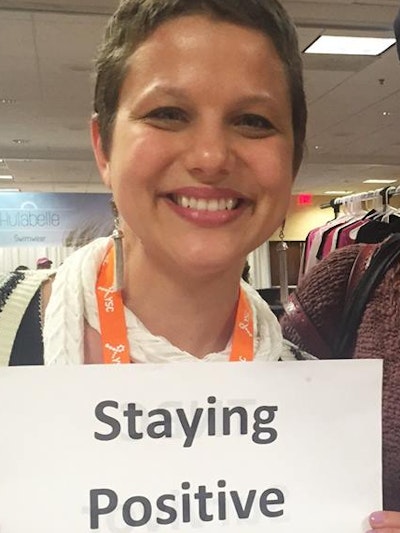The diagnosis of metastatic TNBC is frightening for women and the people who love them. These cancers can be treated. There are increasing numbers of therapies that are helping women with metastatic TNBC and hundreds of clinical trials testing new approaches. At this time, if the cancer has spread to distant organs, it is not usually considered curable. The goal of treatment becomes to control the cancer and its symptoms.

Living with Metastatic TNBC
A difficult diagnosis
Treating metastatic TNBC
Chemotherapy
Once TNBC has spread, the primary treatment remains chemotherapy. The FDA has approved a number of drugs to treat metastatic TNBC. Many patients receive a single drug for as long they respond and then move onto to second and third lines of therapy, often using one drug at a time as well. This is called sequential single drug therapy. In other cases, drugs are combined with each other. Your doctor will discuss the options and make the decision about your treatment based on your cancer, your previous treatment and your individual goals and preferences.
About one-third of patients with metastatic TNBC will have an initial response to chemotherapy. Their tumors will either shrink or stop growing. The problem is that the cancer often becomes resistant--meaning that the cancer cells stop responding to the therapy. With each new drug, the chances of responding go down and the response time becomes shorter as the ability of the cancer cells to resist the treatment goes up. That’s why it is so important to find effective new approaches to treating metastatic TNBC.
Targeted Drug Therapies
Antibody-Drug Conjugates (also known as ADCs) help target and deliver chemotherapy directly into cancer cells and surrounding tissue, leading to higher efficacy and reduced damage to surrounding normal, healthy cells. Most ADCs have chemotherapy-like side effects.
The ADC sacituzumab (brand name Trodelvy) is approved for locally advanced and/or metastatic TNBC for those who have already received two or more systemic therapies (at least one of them for metastatic disease). Sacituzumab significantly improves survival compared to standard chemotherapy. Sacituzumab is currently being investigated for early stage breast cancer, so it may be approved for early stage TNBC in the future. Ask your doctor about adding antibody-drug conjugates to your chemotherapy treatment plan.
Immunotherapy
Using medicines, immunotherapy boosts your immune system so that it can do a better job of recognizing and fighting cancer cells. To do this, immunotherapy medicines target specific immune system proteins.
Pembrolizumab (Keytruda) is an immunotherapy drug that targets the PD-1 protein. Pembrolizumab was approved for advanced PD-L1+ TNBC in 2020 based on the KEYNOTE-355 trial. Based on ongoing data from this trial, we know that adding pembrolizumab to chemotherapy for advanced PD-L1+ TNBC improves survival. Recently, pembrolizumab was found to improve outcomes for women with early stage TNBC, and was just approved for use in those with high-risk, early-stage TNBC. Talk to your doctor about pembrolizumab, its side effects, and its treatment regimen to decide if it is right for you.
Clinical Trials
The reality is that there is an urgent need for new and better therapies for metastatic TNBC. Those therapies are developed in research studies, known as clinical trials, that compare existing treatments to new approaches. These trials are designed to determine if the new treatments are safe and effective for patients. Women who have been diagnosed with metastatic TNBC should discuss the possibility of participating in a clinical trial with their physician. Patients who participate in trials have access to the newest therapies, receive excellent care and make a real contribution to the future of treating metastatic TNBC.
Find a metastatic TNBC clinical trial
With the emergence of studies using new agents and combinations of drugs, it is often advisable to think about a trial before you begin first line therapy for metastatic TNBC. Patients who have undergone multiple courses of therapy are often still eligible for trials but these patients may have more symptoms and medical problems and decreased chances of benefiting from the trial. Any doctor treating metastatic TNBC should either be participating in clinical trials or be aware of ongoing trials and be willing to refer patients to these studies.
Palliative and Supportive Care
Living with advanced TNBC is often difficult, emotionally and physically. It’s important to identify and make use of the support that is available, whether it be family, friends, therapists, support groups, financial counselors, social workers or members of the community. Let people know your concerns and what you need from someone, whether it is to watch the kids, provide a ride to your appointment, be another set of ears or a friend who can listen.
It’s also important to know what services are available to help deal with any physical symptoms that you have. Request a referral to Palliative Care as soon as you get your diagnosis. Palliative Care is there to help with the full range of emotional and physical issues you may encounter throughout the course of your illness.
If you are experiencing financial problems, either related to your treatment or to your life, let your health care team know. There are resources that can help with those issues as well.
We are here to help
The Triple Negative Breast Cancer Foundation has partnered with CancerCare to offer free, professional support services to patients, families and health providers coping with a diagnosis of triple negative breast cancer.
The TNBC Helpline is staffed by experienced oncology social workers with specific knowledge of triple negative disease. In addition to counseling, TNBC Helpline staff can assist callers in availing themselves of the various other services CancerCare has to offer including, where appropriate, helping patients apply for co-pay assistance, transportation and other social services.
Monday-Thursday
10am to 6pm ET
Friday 10am to 5pm ET
You can also email us at: TNBCHelpline@cancercare.org






